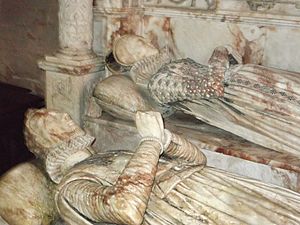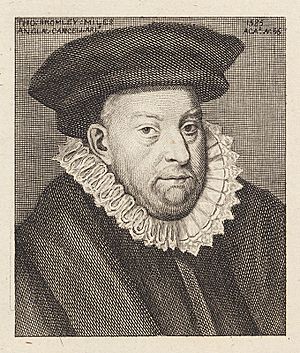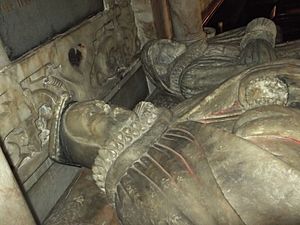Francis Bromley facts for kids
Francis Bromley (born around 1556, died 1591) was an English politician from a powerful family in Shropshire. His family was known for being important lawyers and owning a lot of land. He became a Member of Parliament (MP) for Shropshire in 1584. Sadly, his career ended early because he passed away young.
Contents
About Francis Bromley's Family
Francis Bromley was the oldest son of Sir George Bromley and Joan Waverton.
- Sir George Bromley was his father. He was a very important lawyer. He held powerful jobs with the Duchy of Lancaster and the Council in the Marches of Wales. He was also the chief judge of Chester.
- Joan Waverton was his mother. She was the daughter of John Waverton of Worfield. George Bromley gained Hallon, a family home, through his marriage to Joan.
Many of Francis's relatives, including his father, became wealthy and powerful through law. His uncle, Thomas Bromley, became the Lord Chancellor, a very high legal position. Another uncle, also named Thomas Bromley, became the Chief Justice. Francis also had a younger brother, Edward Bromley, who later became a judge called a Baron of the Exchequer.
Francis's Education and Training
Francis Bromley went to Shrewsbury School in 1565. This school was quite new at the time. He then started at Magdalen College, Oxford on January 10, 1575. He was 19 years old then, which helps us know he was born around 1556.
In 1577, Francis was allowed to join the Inner Temple, a famous law school. His father and uncle were important leaders there. It's likely he joined for free or at a lower cost because of his father's high position. His brother Edward also joined later. While Edward became a well-known lawyer, Francis didn't continue his law studies in the same way. His legal training was probably meant to help him manage his future lands in Shropshire. In 1583, he became a Justice of the Peace, helping to keep law and order in his area.
Becoming a Member of Parliament
In November 1584, Francis Bromley was chosen to represent Shropshire in Parliament. Back then, these county seats were usually given to important local landowners. Francis's father, Sir George Bromley, was very influential in the area. This made it easy for Francis to get a seat in Parliament. Francis took the second seat, after Walter Leveson.
Parliament met on November 23 and lasted for about ten months. Francis Bromley did not play a very big role. In February 1585, he joined a committee that looked at the queen's main way of collecting taxes. However, in March, he was allowed to return to Shropshire for court sessions.
Francis as a Landowner
Sir George Bromley, Francis's father, died on March 2, 1589. Francis then inherited the family's lands. These lands were spread across northern Shropshire, including places like Hawkestone, Wistanswick, Allerton, and Hallon.
However, Francis Bromley only managed the family estates for two years. He died in 1591, leaving his young son, Thomas, to inherit everything.
Francis's Marriage and Family
In 1581, Francis Bromley married Joyce Leighton. Joyce was the daughter of:
- Edward Leighton of Wattlesborough.
- Anne Darrell.
This marriage was between two powerful families in the county. Edward Leighton, Joyce's father, was a very important political figure in Shropshire during the 1580s.
Francis Bromley and Joyce Leighton had two children:
- Thomas Bromley, who was the heir. He married Eleanor Jenks but died in 1610 without having any children. This meant the Bromley estates went to Francis's younger brother, Edward Bromley. Edward also died without children in 1626, so the estates then went to Sir George's third son, also named George.
- Jane Bromley, who married William Davenport.
After Francis Bromley died, his wife Joyce married again. She became the second wife of Walter Wrottesley. Later, there was a long and difficult legal fight over Hallon, the family home. William Davenport and Jane Bromley, Francis's daughter, claimed they should own Hallon. Edward Bromley, Francis's brother, thought it was his. In the end, the Davenports won the dispute. Hallon became known as Davenport House.
Family Tree
| Francis Bromley, his successors and other descendants of George Bromley | |||||||||||||||||||||||||||||||||||||||||||||||||||||||||||||||||||||||||||||||||||||||||||||||||||||||||||||||||||||||||||||||||||||||||||||||||||||||||||||||||||||||||||||||||||||||||||||||||||||||||||||||||||||||||||||||||||||||||||||||||||||||||||||||||||||||||||||||||||||||||||||||||||||||||||||||||||||||||||||||||||||||||||||||||||||||||||||||||||||||||||||||||||||||||||||||||||||||||||||||||||||||||||||||||||||||||||||||||||||||||||||||||||||||||||||||||||||||||||||||||||||||||||||||||||||||||||||||||||||||||||||||||||||||||||||||||||||||||||||||||||||||||||||||||||||||||||||||||||||||||||||||||
|---|---|---|---|---|---|---|---|---|---|---|---|---|---|---|---|---|---|---|---|---|---|---|---|---|---|---|---|---|---|---|---|---|---|---|---|---|---|---|---|---|---|---|---|---|---|---|---|---|---|---|---|---|---|---|---|---|---|---|---|---|---|---|---|---|---|---|---|---|---|---|---|---|---|---|---|---|---|---|---|---|---|---|---|---|---|---|---|---|---|---|---|---|---|---|---|---|---|---|---|---|---|---|---|---|---|---|---|---|---|---|---|---|---|---|---|---|---|---|---|---|---|---|---|---|---|---|---|---|---|---|---|---|---|---|---|---|---|---|---|---|---|---|---|---|---|---|---|---|---|---|---|---|---|---|---|---|---|---|---|---|---|---|---|---|---|---|---|---|---|---|---|---|---|---|---|---|---|---|---|---|---|---|---|---|---|---|---|---|---|---|---|---|---|---|---|---|---|---|---|---|---|---|---|---|---|---|---|---|---|---|---|---|---|---|---|---|---|---|---|---|---|---|---|---|---|---|---|---|---|---|---|---|---|---|---|---|---|---|---|---|---|---|---|---|---|---|---|---|---|---|---|---|---|---|---|---|---|---|---|---|---|---|---|---|---|---|---|---|---|---|---|---|---|---|---|---|---|---|---|---|---|---|---|---|---|---|---|---|---|---|---|---|---|---|---|---|---|---|---|---|---|---|---|---|---|---|---|---|---|---|---|---|---|---|---|---|---|---|---|---|---|---|---|---|---|---|---|---|---|---|---|---|---|---|---|---|---|---|---|---|---|---|---|---|---|---|---|---|---|---|---|---|---|---|---|---|---|---|---|---|---|---|---|---|---|---|---|---|---|---|---|---|---|---|---|---|---|---|---|---|---|---|---|---|---|---|---|---|---|---|---|---|---|---|---|---|---|---|---|---|---|---|---|---|---|---|---|---|---|---|---|---|---|---|---|---|---|---|---|---|---|---|---|---|---|---|---|---|---|---|---|---|---|---|---|---|---|---|---|---|---|---|---|---|---|---|---|---|---|---|---|---|---|---|---|---|---|---|---|---|---|---|---|---|---|---|---|---|---|---|---|---|---|---|---|---|---|---|---|---|---|---|---|---|---|---|---|---|---|---|---|---|---|---|---|---|---|---|---|---|---|---|---|---|---|---|---|---|---|---|---|---|---|---|---|---|---|---|---|---|---|---|---|---|---|---|---|---|---|---|---|---|---|---|---|---|---|---|---|---|---|---|---|---|---|---|---|---|---|---|---|---|---|---|---|---|---|---|---|---|---|---|---|---|---|---|---|---|---|---|---|---|---|---|---|---|---|---|---|---|---|---|---|---|---|---|---|---|---|---|---|---|---|---|---|---|---|---|---|---|---|---|---|---|---|---|---|---|---|
|
|||||||||||||||||||||||||||||||||||||||||||||||||||||||||||||||||||||||||||||||||||||||||||||||||||||||||||||||||||||||||||||||||||||||||||||||||||||||||||||||||||||||||||||||||||||||||||||||||||||||||||||||||||||||||||||||||||||||||||||||||||||||||||||||||||||||||||||||||||||||||||||||||||||||||||||||||||||||||||||||||||||||||||||||||||||||||||||||||||||||||||||||||||||||||||||||||||||||||||||||||||||||||||||||||||||||||||||||||||||||||||||||||||||||||||||||||||||||||||||||||||||||||||||||||||||||||||||||||||||||||||||||||||||||||||||||||||||||||||||||||||||||||||||||||||||||||||||||||||||||||||||||||
 | Ernest Everett Just |
 | Mary Jackson |
 | Emmett Chappelle |
 | Marie Maynard Daly |




